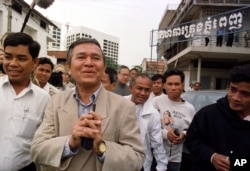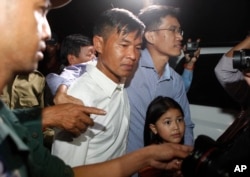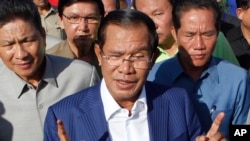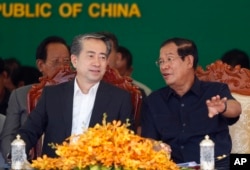Three U.S. senators have introduced a bipartisan bill that they say is aimed at restoring democracy in Cambodia in the face of deteriorating human rights and rising Chinese influence.
The Cambodia Accountability and Return on Investment Act of 2019 (CARI Act or S-1468) was put forward this month by Sens. Lindsey Graham, R-S.C., Dick Durbin, D-Ill., and Marco Rubio, R-Fla.,who say they want to see the full implementation of the Paris Peace Agreement that Cambodia signed with the international community in 1991.
The bill provides for stiff financial penalties on Cambodia if it fails to make a number of specified reforms. These penalties include U.S. opposition to loans to Cambodia by international institutions such as the World Bank or International Monetary Fund and visa restrictions on government officials who violate human rights. Some Cambodian officials could also have American-held assets frozen.
Graham, chairman of the Senate Judiciary Committee, told VOA's Khmer service he was also "very concerned" about the growing Chinese influence in Cambodia and called for the Cambodian government to stop its persecution of opposition politicians.
"It's very important to push back," Graham said.
The CARI Act requires Cambodia to "protect its sovereignty from interference" by China and demands the release of and the dropping of all criminal charges against the nation's opposition leaders. The bill, a copy of which was provided to VOA, specifically calls for the "immediate and unconditional release from house arrest of opposition politician Kem Sokha and the dismissal of the politically motivated charges against him."
The bill also demands the dismissal of politically motivated charges against other opposition leaders and supporters, including opposition leader Sam Rainsy as well as dissidents, government critics and journalists. It specifically mentions Radio Free Asia journalists Uon Chhin and Yeang Sothearin, who have been charged with espionage.
The bill also demands that Cambodia repeal restrictive changes to the law on political parties passed in 2017 and early this year.
The opposition Cambodia National Rescue Party (CNRP) was dissolved in late 2017 by Cambodia's supreme court, and its 118 officials were banned from politics for five years. In a fresh crackdown, 140 former local officials of the party have recently been summoned by the courts and police for questioning in relation to alleged violations of the court's ruling.
"Cambodian Prime Minister Hun Sen and his regime continue to wield their totalitarian iron glove and violate the rights and freedoms of the Cambodian people," Rep. Alan Lowenthal, D-Calif., told VOA Khmer by e-mail. "We must not be fooled. We must not be distracted. No matter what [Hun Sen] says, these recent incidents show clearly that he has no desire for a multiparty democracy in Cambodia."
Lowenthal added that Hun Sen's "only desire is quite simply to hold the reins of power and continue ruling." He said the U.S. Congress "must move forward, quickly and intently, to bring the full weight of the U.S. government against Hun Sen before he destroys, once and for all, the possibility of Cambodia returning to a democratic nation."
Modest steps toward increased democracy in Cambodia were reversed in the run-up to elections last year in which Hun Sen's Cambodian People's Party won every seat. Opposition leaders were arrested or forced into exile, new restrictions were placed on social media and more than 30 radio frequencies were shut down while critical news outlets were pressured into closure.
Rep. Steve Chabot, R-Ohio, told VOA Khmer via e-mail he believes there "should be consequences" for Hun Sen's continued harassment of his opponents. "In light of his recent actions it is even more important that Congress pass legislation like the Cambodia Trade Act," a separate bill that would require the Trump administration to reconsider certain trade preferences granted to Cambodia.
The Cambodian government has dismissed the CARI Act as "political propaganda" that does not "reflect the truth" in Cambodia.
"This is just a dream aiming to interfere and control Cambodia," said government spokesman Phay Siphan. "If the politicians are happy to help Kem Sokha, they should find a fund to hire the right lawyer to represent him at the trial. I personally advise those senators to reduce their action so that it will not add more burden on Kem Sokha, who has been accused of being a foreign puppet or working with foreigners to overthrow the elected government."
Siphan maintained that Cambodia is not under China's influence but remains a good friend to the United States and respects its interests.
China is Cambodia's largest investor, donor and trading partner. Military-to-military relations between the countries have been steadily progressing since 2010. At the same time, military relations with the United States have been deteriorating since 2017, when Cambodia announced the indefinite suspension of its annual joint military exercise between the two countries.
The United States is also concerned that China will use Cambodia as a naval base in the future.
CNRP activists abroad have welcomed the CARI Act, describing it as a first step toward resolving the political crisis in Cambodia.
"This law does not only serve the interests of democracy and bringing back the CNRP as well as the release of President Kem Sokha and the dropping of all charges against acting president Sam Rainsy, but it is also an action plan to achieve the U.S. goal to bring back democracy to the country," said Saory Pon, secretary-general of the CNRP Overseas.












